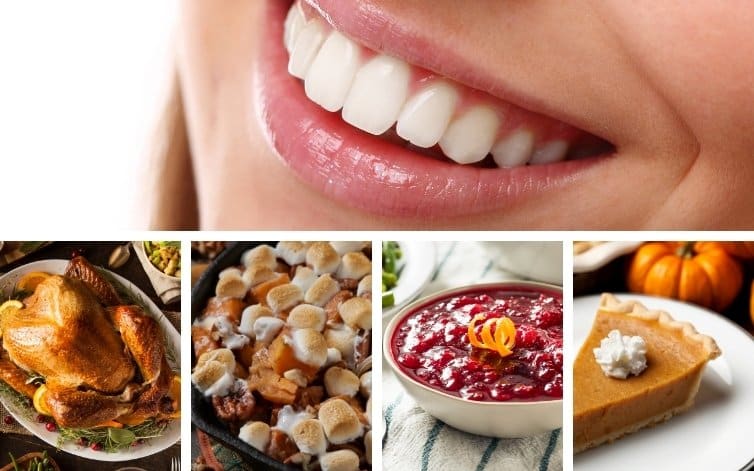Thanksgiving in Oak Forest brings together families for a festive celebration filled with delicious dishes. Tables are piled high with turkey, mashed potatoes, cranberry sauce, and sweet pies. Amid the laughter and chatter, it’s easy to forget that some of these beloved Thanksgiving foods can pose a threat to dental health. While indulging in these festive treats, many overlook how certain ingredients—rich in sugar, acidity, and starch—can harm teeth.
For Oak Forest residents, understanding the risks of popular Thanksgiving foods is key to keeping smiles bright and healthy. This blog explores the foods that can be tough on teeth and offers tips on how to enjoy the feast without compromising dental well-being.
Understanding the Local Context
Oak Forest, a close-knit community, is known for its tradition of gathering with family and friends around hearty meals. Thanksgiving is one of those special occasions where food plays a central role. From savory to sweet, Oak Forest tables are filled with food that draws people together. But with all the deliciousness comes a hidden danger—dental problems.
Many Oak Forest residents face common dental issues, like cavities, gum disease, and tooth sensitivity. These problems can worsen when we indulge in foods high in sugar, acid, and starches, which can lead to plaque buildup, enamel erosion, and tooth decay.
Thanksgiving foods are typically rich in all of these, making them a real challenge for your teeth. The combination of sticky, sugary foods and acidic dishes can cause more harm than expected. While you’re enjoying that second serving of cranberry sauce or a slice of pumpkin pie, your teeth are working overtime, potentially damaging enamel and causing discomfort later.
It’s crucial for Oak Forest families to be aware of the dental risks tied to Thanksgiving foods. Understanding these risks can help you make better choices this holiday season and protect your smile from unnecessary harm.
The Feast: Delicious, but Hard on Teeth
Turkey and Gravy: Chewy Meat and Sticky Sauces
While turkey is the centerpiece of many Thanksgiving meals, its texture can be tough on your teeth. The meat, especially when not cooked properly, can be chewy and difficult to bite through, putting pressure on your teeth.
Additionally, the gravy that accompanies the turkey is often high in fat and acidity, which can slowly erode enamel over time. Acidic foods weaken tooth enamel, making them more vulnerable to cavities and sensitivity.
Sweet Potatoes & Marshmallows: Sticky, Sugary Threats
Sweet potatoes, often topped with gooey marshmallows, are another holiday favorite. While they may be tasty, marshmallows can damage teeth. Their sticky nature tends to cling to teeth, providing the perfect environment for plaque buildup.
Plus, the high sugar content can feed harmful bacteria in your mouth, leading to cavities and tooth decay. The longer sugar stays on your teeth, the greater the risk for damage.
Cranberry Sauce: Tart and Sugary
Cranberry sauce is a Thanksgiving staple, but it’s not as tooth-friendly as it may seem. Cranberries are naturally acidic, and when combined with sugar to create the sauce, it forms a double threat to your teeth.
The acidity can wear down tooth enamel, while the sugar promotes cavity-causing bacteria. When combined, these two elements can lead to tooth erosion, increasing the risk of sensitivity and decay.
Pumpkin Pie: Sugar & Acid Combination
Pumpkin pie may be a holiday tradition, but it’s not the best choice for your dental health. The pie’s filling is often loaded with sugar, which feeds bacteria that cause cavities.
In addition, the pie’s crust can be slightly acidic, leading to enamel erosion with prolonged exposure. The combination of sugar and acid is a recipe for trouble, especially if you’re indulging in seconds or thirds.
The Caution: Tips for Protecting Your Teeth While Feasting
Moderation is Key: Balancing Enjoyment and Health
Enjoying your Thanksgiving meal doesn’t mean you have to indulge in everything on the table. Moderation is the key. Limit your sugary and sticky foods to help protect your teeth.
For example, choose a smaller serving of sweet potatoes and marshmallows, or pick the turkey over the cranberry sauce. By focusing on balance, you can enjoy the feast without overloading your teeth with sugar and acid.
Stay Hydrated: Water to the Rescue
One of the easiest ways to protect your teeth during meals is to drink plenty of water. Water helps rinse away food particles and neutralizes acids that can damage your enamel.
Drinking water throughout the meal can also help prevent dry mouth, which leads to a higher risk of plaque buildup. So, make sure to sip on water throughout the feast.
Dental Hygiene: Brushing and Flossing After Meals
After the Thanksgiving feast, don’t skip brushing and flossing. Brushing your teeth right after eating helps remove sugars and acids that can linger on your teeth. Flossing removes food stuck between teeth, reducing the chances of plaque buildup.
Just be careful not to brush immediately after eating acidic foods like cranberry sauce. Wait for about 30 minutes to avoid damaging softened enamel.
Chew Sugar-Free Gum: The Benefits
If you cannot brush right away, chewing sugar-free gum is a great alternative. It helps stimulate saliva production, which naturally neutralizes acids in your mouth.
Saliva also helps wash away food particles and bacteria, reducing your risk of cavities. Keep a pack of sugar-free gum on hand to chew after your meal.
Use a Straw: Protecting Your Teeth from Acidic Beverages
During the Thanksgiving meal, you may enjoy a glass of cider or a cocktail. While these drinks are delicious, they can be acidic and harmful to your teeth. To minimize the damage, try using a straw. A straw helps direct the liquid to the back of your mouth, limiting contact with your teeth and reducing the risk of enamel erosion.
While Thanksgiving is a time for celebration and indulgence, it’s essential to be mindful of the foods that can harm your dental health in Oak Forest. Foods like turkey, cranberry sauce, sweet potatoes, and pumpkin pie can all have negative effects on your teeth, especially when consumed in large amounts.
By practicing moderation, staying hydrated, brushing and flossing after meals, and using simple tricks like chewing sugar-free gum and drinking through a straw, you can protect your teeth while enjoying the feast. This holiday season, balance your love for great food with a little extra care for your smile.

